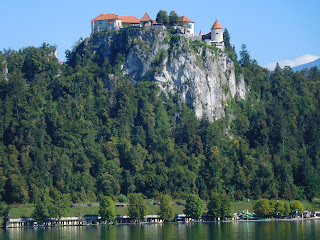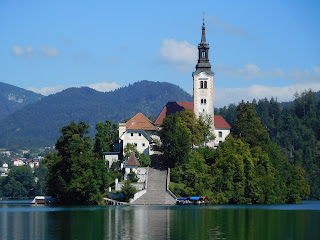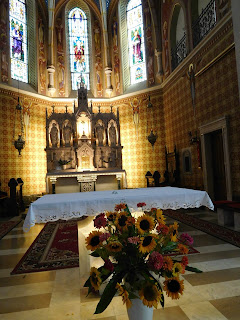Our alarm clock said 7:45
so we quickly got up, showered and left our tiny room as we had an exciting day
planned ahead. We were going to visit one of the most beautiful sights in Slovenia
called Lake Bled
As you know from reading these posts, so many of our days
are filled with walking tours, seeing museums, churches, etc so today was a
welcome break from being a ‘culture vulture’ as we’d just be enjoying nature.
Bled, the town, doesn’t have many attractions as the lure
for everyone coming is the crystal clear lake, a very small island in the
middle of the lake with only a church on it and a castle clinging precariously atop a cliff.
The mountains poking above the ridge at the far end of the
lake are the Julian Alps . The big mountain behind the
town of Bled Austria
We had nothing in mind except to stroll the 3.5 miles around
the lake on the mostly crushed gravel trail and, at some point, take a boat
over to the island. It was such a scenic and peaceful walk. Darlene: I couldn’t
help but think of our early morning daily walks around Clement as you would
have loved this lakeside walk too.
Bled’s cliff-hanging castle, dating in one form or another
from 1,000 years ago, was the seat of the Austrian Bishops of Brixen who
controlled Bled in the Middle Ages. It's the oldest castle in Slovenia as well as the one with arguably the most dramatic location. We chose to admire it from a distance, however, and not face a very steep hike up the hill.
It was so quiet as we walked around the lake as no motorized
boats are allowed. We saw lots of very avid fishermen and a few
paddleboarders and a smattering of rowboats, being rowed, I mean, not just on the shore!
We passed some great villas, most of them from the beginning of the 19th century. The most significant one was Vila Bled which had been the summer residence for the Yugoslav royal family before WWII. When Josip Broz Tito became the leader of Yugoslavia at the end of the war until his death in the late 80s, he used the villa as one of his homes. During his heyday, Tito entertained international guests here from both the communist and non-aligned world: from Indira Ghandi, Nikita Kruschchev, Kim II Sung to Raoul Castro, etc.
It has since been turned into a hotel.
The big attraction for me was being able to gawk at his
Socialist Realist wall murals which decorated the upper walls of a vast
ballroom near his office. They were a fascinating peek at the propaganda of the
time and, through them, we could follow the story of the origins of postwar Yugoslavia .
First was the Nazi destruction of Belgrade
in 1941, a dark moment that inspired the South Slavs to
band together to fight the foreign occupiers. We saw Tito raising his ragtag
army and leading them into battle in Bosnia-Herzegovina.
The next mural depicted a winter spent enduring hardship:
At the end of the long wall, Tito’s victorious Partisans
crushed the vestiges of the Nazis:
The spring blossoms in the upper right hand corner of that same mural represented a promising future for the people of Yugoslavia.
The large panel at the end of the room trumpeted the idealized postwar world that Tito envisioned: proud workers coming from all
walks of life coming together for the betterment of
The room’s focal point is the mother hoisting a young child
with one arm, and the flag of the new Socialist Federal Republic of Yugoslavia
with the other.
We were lucky to be able to wander around other areas upstairs and could even have sent you an email from Tito’s own desk!
As travel writer Rick Steeves penned, Bled’s little island -
capped by a super cute church – nudges the lake’s quaintness level over the
top. While it’s pretty to look at from afar, we also wanted to visit it.
A boat unique to Lake Bled called a pletna but more on that in a minute:
A photo of the front of the island:How much more beautiful than this can you imagine? You have a super cute island, a lovely church, a castle atop a cliff and the Alps in the background.
Most of the trail around the lake was not as close to the water as in this part so this was an especially lovely gorgeous area. Plus there were few people too which mde it even more appealing.
The swan is considered to be the symbol for
The pletna is an important symbol of Lake
Bled Venice . This family tradition
has evolved into a modern union of pletna oarsmen which continues to this day.
There’s no keel so the oarsmen work hard to steer the
flat-bottomed boat with each stroke. There are 21 official pletnas on Lake
Bled
We had walked halfway around the lake by this point so we
welcomed the opportunity to take a pletna ride over to the island which is the
only island in all of Slovenia
by the way.
Figured that this group of swimmers must be from a swim club
as they all had identical swim caps and were extremely powerful swimmers.
Perhaps another Michael Phelps in the making? They were the only ones we saw swimming in the lake except for those very close to the beach.
Since we didn’t get the pletna from the main spot, i.e where
we had begun our tour of the lake, our ride was a lot shorter and the boat
moored at the small dock on the back of the island.
We were given just 40 minutes on the island before having to
meet back at the boat. We walked around to the front so we get a first hand
look at the massive steps and the church up at the top.
The island has long been a sacred site with a romantic
twist. On summer Saturdays, a steady procession of brides and grooms, cheered
on by their entourages, heads for the island. Ninety-nine steps lead from the
island’s main dock up to the Church of the Ascension on top. It’s tradition for
the groom to carry - or try to carry - his bride up these steps. About four out
of five are successful, thereby proving themselves ‘fit for marriage.’
Adam: Aren't you glad you and Natalie will be getting married next September in Michigan so you won't have to follow this tradition?!
What a view from the top of all those steps:Adam: Aren't you glad you and Natalie will be getting married next September in Michigan so you won't have to follow this tradition?!
The island’s main attraction is the church which is also called the Church of the Mother of God on the Lake. An 8th century
Slavic pagan temple, dedicated to the goddess of love and fertility, once stood
there. The current Baroque version is the fifth to occupy this space.
Photos of the church:
We couldn’t wait to go inside and find the rope for the church bell hanging in the center of the aisle just before the altar. A local superstition claims that if you can get the bell to ring three times with one pull of the rope, your dreams will come true.
Janina: As I write this on the
bus en route to Split , Croatia
I wonder what Steven was wishing as he pulled the rope?
Perhaps just to get the bell to ring!
I read some interesting information about the Wishing
Bell in the information brochure we got from Tourist Information. According
to it, the story of its coming to be is a conscious mix of fact and fiction. A
lady, who lived at Bled Castle Rome
and entered a convent. When she died, the Pope ordered the building of another
bell to be transported to Bled. The bell was indeed made in Rome
but how much of the rest of the story is true is unknown but it makes for a
good tale.
When the church was being renovated in the 1970s, workers
dug up several medieval graves. We could see one through the glass under the
rope – a tad spooky, don’t you think?
We got to the top just before the proverbial clock struck twelve and what a deafening noise it was as the bell pealed for several minutes. The clock was a restored pendulum mechanism from 1890. Unfortunately, we couldn’t see much because mesh covered the beautiful views of the lake.
The café at the top of the stairs sold a Slovenian nut-roll cake called potica. When we had bought our tickets to come here at the bus station in
Photo of potica:
I would have like more than just 40 minutes at the island as I felt it was a mad scramble trying to enjoy the stunning views, hike up and down the 99 steps, tour the church and the bell tower, taste the potica AND walk around the island to get back to the pletna with a minute or two to spare.
Our pletna oarsman told us that the European Rowing Regatta Championships had recently taken place on
Near the end of the hike around the lake, we saw the town’s lovely St. Martin Church and Monastery. Now when was the last time you knew us to pass up seeing the inside of a church, mosque or temple?! We had only been in one place of religious worship all day, certainly a new record for us, so we spent a few peaceful minutes inside St. Martin's.
After having an absolutely delightful time walking around
the charming Lake Bled 1:30
and decided to buy a ticket for the shuttle bus going to nearby Vintgar Gorge
which was only located 15 minutes away. We were sure relieved it was so close as the driver was one of the worst we’ve ever had. He drove
like he was a NASCAR driver in the making on particularly narrow, serpentine
country lanes while he was smoking, fiddling endlessly with the car radio and
his phone AND at high rates of speed the entire journey - yikes! We couldn’t
say anything to him, either, because we didn’t know whether he would be our
sole means of transport back to Bled in a couple of hours so we were at his
mercy.
Luckily we did arrive with all limbs intact and ready to
start our next adventure, hiking the very narrow trail into the gorge. We were
there on a weekday and Steven and I commented how fortunate it was that it
wasn’t a weekend as the throngs of people were bad enough as it was. At best,
we were only able to walk single file for 75% of the time on the boardwalk/gravel
trail that hugged the cliffs that rose way above us.
Vintgar Gorge was discovered in 1891 and it was opened to
the public just two years later. Constructing a trail through the wild gorge
must have been a demanding and extremely difficult task.
I can’t ever remember ever having to wait in line while hiking
while a stream of people came from the opposite direction. But, in case I sound
like Negative Nelly, we had a really fun time as the sights of the rushing
waters in the river beside us, the small waterfalls, rapids and never knowing
what view we would have as we turned yet another corner in the trail kept us
going.
There were a number of bridges across the Radovna
River
I loved how the water changed colors depending on the light hitting it in a particular spot.
It was hard having a set time having to be back to meet the
driver because we didn’t know how leisurely or how quickly we needed to hike to
be able to reach the end of the canyon. We tended to go at a pretty fast clip
on the way into the gorge, allowing for the crowds of course, so we were sure
of seeing it all and knowing that we could therefore have a more relaxed return
trip if we had the time.
At the end of the gorge was a short path to a magnificent 40
foot high waterfall which is the highest one in Slovenia .
We did get back a little early to meet the shuttle at the
entrance to the National Park so we rewarded ourselves with chocolate covered
ice cream bars. What a nice and welcome treat.
There was a spot for people to donate loose change to the
Slovenian Red Cross so Steven dumped in his remaining Ukrainian coins. Wonder
which unenviable worker had the task of sorting out currency from every
European and many other nations as well!
Thought this sign was cute; it made sense, though, considering that in so many nearby countries, you can't put TP in the toilet.
While waiting in the parking lot for the shuttle, we saw
cars from 12 different nations – I was so surprised that Vintgar Gorge drew other tourists
from so far afield.
We were unlucky enough to have the same driver pick us up
for the return trip. He got back to Bled in a record eight minutes, in enough
time to have made Mario Andretti proud driving the country lanes really only
wide enough for one car!
We only had a short time to wait for the bus
back to Ljubljana



































































What a lovely nature day, enjoying God's creations. I would have loved your NASCAR driver. Yes, one pull and 3 bell rings, what a great challenge. I would have loved your day on Lake Bled. Lil Red
ReplyDeleteLike Lil Red, I too would have savoured every minute of your day under the sun admiring the beautiful Lake Bled and its special island ! Gorgeous photos of a memorable day! xo Lina
ReplyDeleteLil Red and Lina,
ReplyDeleteOur day visiting Lake Bled and Vintgar Gorge is stll one of our trip's highlights so far, even though we have toured many other fantastic places since then.